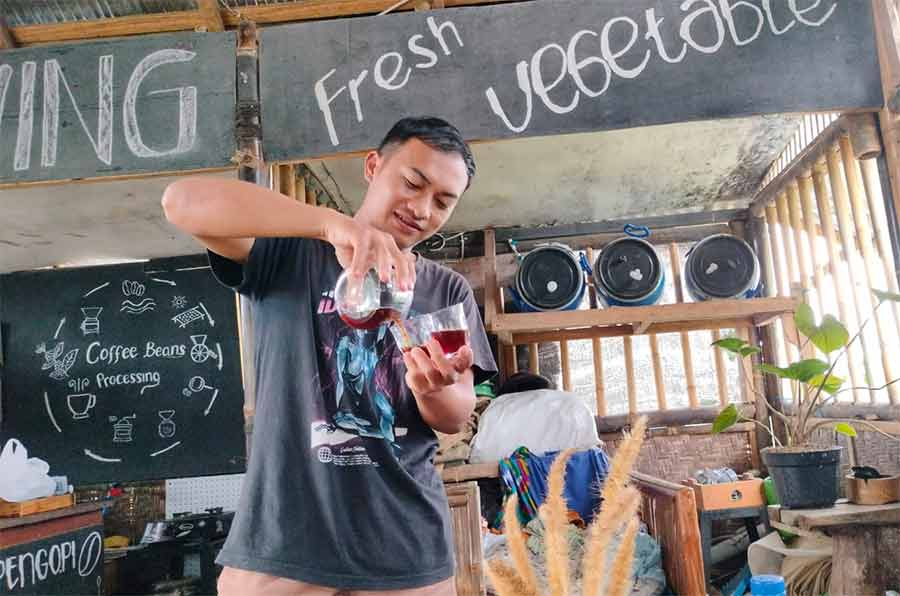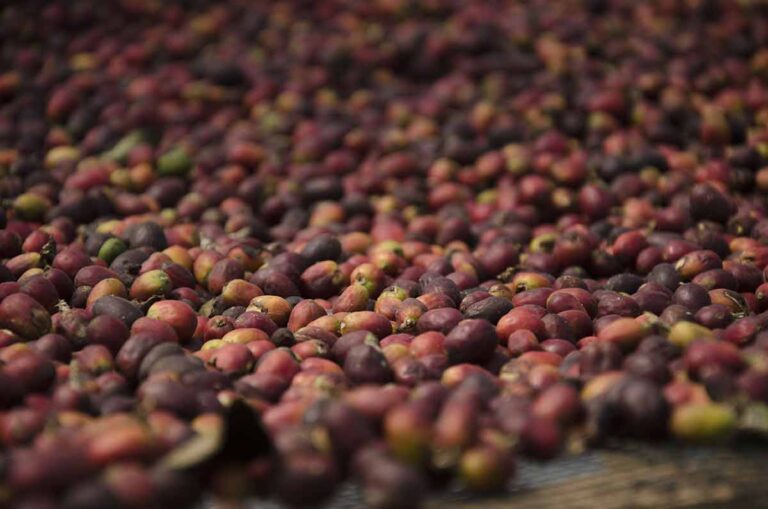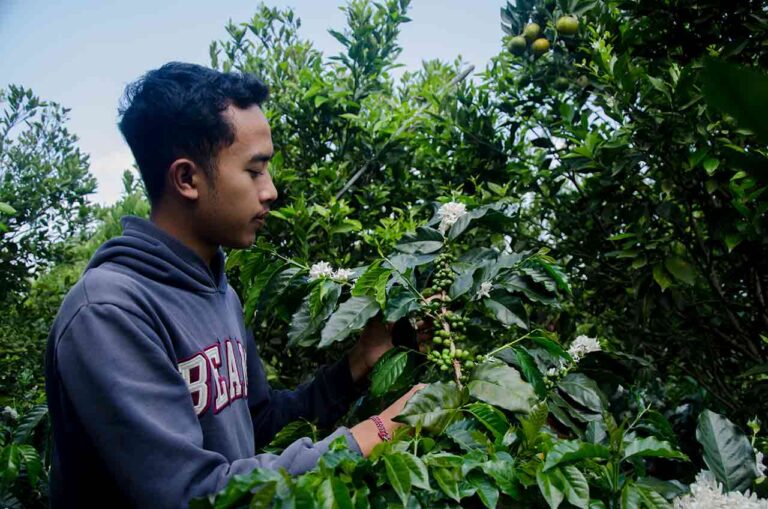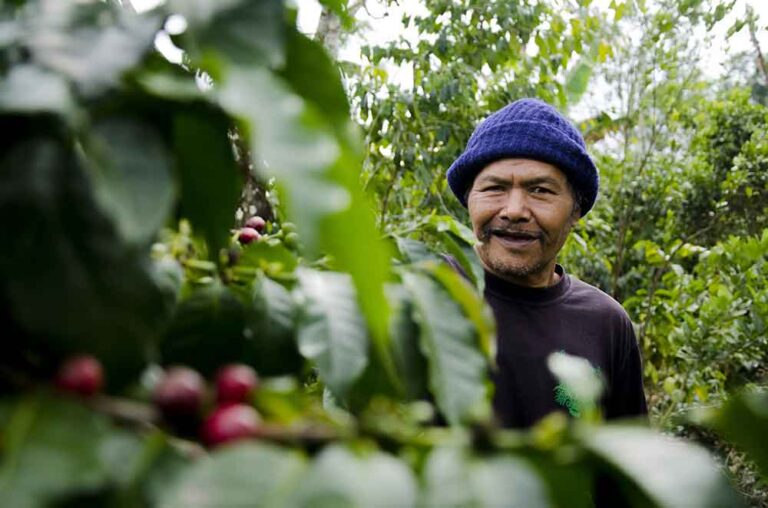“The coffee comes from a plantation outside this village, but it’s called Pelaga Coffee. Why is that?” said I Gede Setia Nugraha, a coffee farmer from Pelaga Village, with concern.
That afternoon, we accidentally saw a small coffee shop on the left side of the road while we were on our way home from Kintamani to Ubud. It was called Kedai Pengopi, not far from the Tukad Bakung Bridge that we had just passed.
The cool air that hit along the road of Pelaga Village seemed to invite us to stop for a moment to enjoy the warmth of Pelaga Coffee.
This small coffee shop looks simple. Several potted coffee trees are planted in a row in front of the shop’s terrace. A long bench is piled up on the terrace for those who want to sip coffee while enjoying the view around.
A small bar crammed with coffee equipment and decorations fills the corner of the not-too-large room. The rest of the fairly spacious room is filled with long benches and large tables for customers to relax and enjoy their coffee.
I Gede Setia Nugraha, usually called Bli De Nu, greeted us enthusiastically as if meeting an old friend. He had just returned from the coffee plantation not far from behind his shop.
He quickly moved behind the bar and began explaining the various roasted beans available. We just went along with what Bli De Nu chose. We already had expectations that the character of the coffee would be similar to Kintamani Coffee, which we also like.
“Try the full-washed Pelaga Coffee,” he offered.
We agreed. The gurgling sound of roasted beans being poured, weighed, and then the sound of the hand grinder grinding crispy with the agile rotation of this farmer acting as a barista.
Although there is a grinder machine, Bli De Nu admitted that he prefers to use a manual grinder. To give a more classic impression, he said.
Pelaga is a village in Badung Regency, directly bordering Kintamani, which is on the northeast side, a higher area. Kintamani is a producer of Arabica coffee, which is very popular, especially since it received a geographical indication certification from the government.
“Let’s try full-washed Pelaga Coffee from my garden,” he said while holding out a shot glass and pouring his V60 brew.
The aroma of jasmine and brown sugar wafted, tempting me to immediately sip it, hoping for the fresh, acidic orange taste typical of Kintamani Coffee to greet the mouth cavity. But this coffee is not too acidic, tends to be soft but fresh, and is very comfortable on the tongue. The sweet taste seems to jump against the background of the softness of fresh lychee fruit. Clean aftertaste makes this coffee so enjoyable.
This is clearly different from Kintamani Coffee. Bli De Nu smiled seeing our slightly surprised expressions.
“This is what Pelaga Coffee really is. It’s different from Kintamani Coffee because the height of the garden and the character of the soil are not the same,” he said.
Now Bli De Nu has turned his hand grinder, this time roasted beans that he got from Wana Prastha, a fellow coffee farmer from Gunungbau Village, Kintamani.
“Previously, 90 percent of Pelaga farmers planted Arabica coffee. Now it’s probably only 30% left,” said Bli De Nu, while pouring coffee powder into a paper filter.
Indeed, there is no definite data on coffee plantation production in Pelaga Village. Even trying to find it at the Bali Central Statistics Agency, it can’t be found. The website is in the process of updating the application; that’s the notification that appears when we open it.
“Because the coffee plants in Pelaga were attacked by disease and their productivity dropped drastically, farmers switched to growing vegetables, marigold flowers, and asparagus,” he said.
This could also indicate that currently, coffee is no longer an agricultural and plantation commodity with a significant enough volume to be recorded in the statistics of Badung Regency.
That’s why he was suspicious; there was a lot of coffee that didn’t actually come from his village but was labeled as Pelaga Coffee.
However, labeling coffee from outside the village with the Pelaga Coffee brand is certainly not a good way to strengthen the identity of coffee from this village.
“If it’s not coffee from this village, why should it be called Pelaga Coffee?” He regretted it again.
Coffee brew from Gunungbau Village is already on the coffee server in his hand. Bli De Nu pours it into a sloki for us to taste. He wants to show the contrast of the different characters of coffee from different villages.
Yes, the coffee tastes different. It is more acidic, with a sweet flavor like a ripe orange. But both coffees are very enjoyable.
“If I choose honest coffee. If it’s from Kintamani, I say it’s Kintamani Coffee. If it’s from Pelaga, I say it’s Pelaga Coffee. From the plantation in Belantih, I say Belantih Coffee. Because each has its own distinctive taste,” he said firmly.
Bli De Nu is the nickname of I Gede Setia Nugraha, a hereditary coffee farmer since his grandfather, I Nyoman Juta, pioneered it in the early 1980s.
Since he was young, he has been involved in the coffee plantation following his grandfather’s daily activities. From sowing seeds, planting, caring for, harvesting, and processing the harvest, he learned and practiced everything with his grandfather.
It’s no wonder that he knows very well the situation of the Pelaga Village coffee plantation. He was born and raised in this village, hanging out with coffee farmers from a young age until now.
“Coffee farmers have switched to growing vegetables and flowers since coffee plants have been affected by disease. In addition, because vegetables and flowers can be harvested more often, they can be used to finance daily needs,” he said.
This is different from coffee, which only has a harvest period once a year. If the harvest and price of coffee are not good, farmers cannot wait to meet their daily needs.
It seems that Pelaga Coffee’s brand, whose popularity exceeds production capacity, if there is sufficient accurate data, should have great potential that can be maximized. For example, by re-invigorating farmers to grow coffee. Pelaga can regain its prominence as one of the coffee centers in Bali.
Bli De Nu feels the need to maintain the identity of Pelaga Coffee so that it does not sink and is obscured by errors in identifying coffee flavors due to the use of inappropriate labels.
“That’s why I don’t want to do many experiments in the coffee bean fermentation process. Because I want the original taste of Kopi Pelaga not to be disguised by various fermentation processes,” he said.
He hopes that Pelaga Coffee can emerge with its original identity, which is indeed unique. Not the same as coffees from other areas in Bali.
After the original Pelaga Coffee was well known, he felt freer to experiment with various fermentation methods that could further explore the taste of Pelaga Coffee.
Coffee should be honest, as it is. Because Bali, like Indonesia, has a geographical distribution that can produce a variety of unique coffee flavors.
The diversity of coffee flavors is the wealth of this country that should be an extraordinary added value. It would be a shame if this diversity was not maintained but instead obscured by indifference.
“I want to invite roasters and baristas to visit the coffee plantation here so that they know the situation of the coffee plantation in Pelaga Village,” he added.
Because only by providing correct information about the authenticity of Pelaga Coffee to roasters and baristas can Pelaga Coffee be better protected from counterfeiting.
Because they can be more careful in choosing the source of coffee that will be served to coffee lovers. Baristas really know the original Pelaga Coffee.
“Coffee is honest. Because with so many choices, everyone can find a choice that suits their preferences. Don’t like this one; you can choose another one. Isn’t that right?” he said firmly.
Before we knew it, we had been talking for three hours. The night began to be enveloped in darkness, and the cold air became increasingly piercing. We said goodbye to continue our journey home and promised to visit again to find out more about the authentic Pelaga Coffee.
Follow I Gede Setia Nugraha on his social media accounts:
Instagram: @kiadan_coffee




